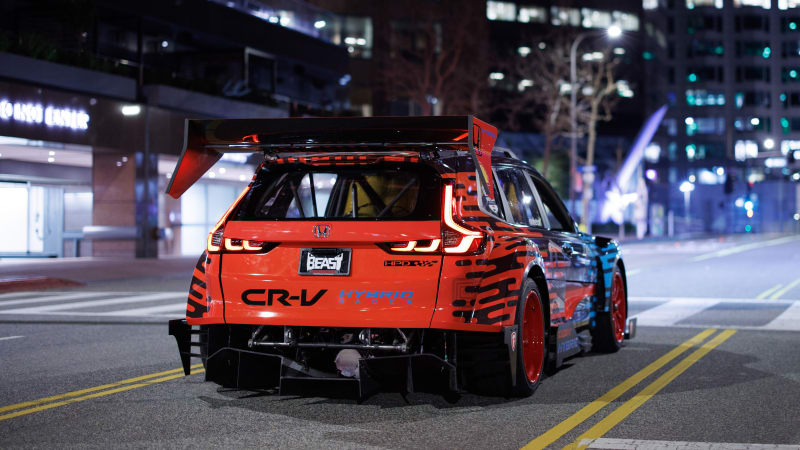GREENCASTLE, Ind. — The driver engages first gear, steps into the throttle, and silently pulls away. How novel, I think to myself. Halfway down pitlane, a massive jolt kicks me in the back, and the sound of a million bees starts buzzing away. This is the Honda CR-V Hybrid Racer — nicknamed “The Beast” by Honda — and it is one seriously wild engineering exercise.
I’m at Putnam Park Roadcourse, just a 45-minute drive outside of Indianapolis, and one day out from witnessing the 107th running of the Indianapolis 500. Inside this mid-engine “CR-V” is about as close as I’ll get to the driver’s seat of an Indy car, though, as that noise behind me is emanating from the 2.2-liter twin-turbo V6 that Honda supplies to the series. Combined with Skeleton Supercapacitors and Empel MGU hybrid motor technology, it makes an eye-watering 800 horsepower.
Accelerating out onto the track, I’m pinned back in my seat as the familiar sound of an IndyCar ferociously tickles my eardrums. I do mean ferociously, as this CR-V is loud and not for the faint-hearted. The reverb and acoustics of the SUV body style create a chamber of sound inside the cabin that any IndyCar fan would gush over — just remember your hearing protection.
We quickly reach cruising speed, and then it’s on to those massive Brembo brakes. Honda yanked the front brakes off of the Acura NSX GT-3 Evo22 racecar, and the rear brakes were adapted from the Dallara IR-18 IndyCar suspension. From the passenger side, they feel rather effective, and though the Honda Performance Development test driver was yelling about them getting a little hot before we set off, he sent it hard anyway.
This thing is so rad. Love the silent, electric pull away, and then the IndyCar engine firing up partway down the pit lane. pic.twitter.com/liN21jFJPK
— Zac Palmer (@zacpalmerr)
May 27, 2023
Interestingly, Honda fitted street-appropriate rubber to this monster of a CR-V — it has Firestone Firehawk Indy 500 summer tires sized 285-section-width in front and 305s in the rear. Honda went with street tires, since they allow for easier show-boating and sideways antics — a number of IndyCar races this year will see the CR-V Racer take parade laps. It’d be far quicker on slicks, but just like so much else about this car, it’s all about the optics.
As a result of the somewhat tame rubber, though, the ultimate cornering grip isn’t as ridiculous as you’d expect. The CR-V stays flat, but it’s also incredibly playful and fun for a driver to toy with throughout a corner and on exit. Two-time F1 World Champion Max Verstappen drove it at an earlier date, and apparently, he rather enjoyed how fun it was to drive.
Of course, what’s keeping this CR-V flat and stable through corners has nothing to do with an actual CR-V. This project is built on a chromoly tube frame chassis and uses suspension from the NSX GT-3 car and Dallara IndyCar. The windshield and greenhouse are from a CR-V, but a whole lot of unique bodywork wraps around the rest of it. That includes butterfly half doors that allow folks to climb in and out. It’s not easy doing so, either, but it wouldn’t be a race car if you didn’t look a little foolish trying to get into your seat.
The hybrid portion of this powertrain is its real party trick, and while it’s difficult to separate its usefulness from the IndyCar engine without driving it myself, I can say that it hauls ass in the straight sections around Putnam Park Road Course. Top speed is limited to what felt like low triple digits for now — Honda only put about 215 testing miles on the car before giving journalists a rip around this racetrack. But given the excessive amount of horsepower, its top speed should be rather high when ungoverned.
There aren’t any plans to take the CR-V Hybrid Racer to actual racing events as of now, but HPD President David Salters didn’t rule it out. Considering the massive amount of downforce generated by the huge wings and winglets, Pikes Peak sounds like a great proving ground for competition.
As for what it means for production Hondas and the CR-V specifically, don’t start thinking that Honda is cooking up a CR-V Type R with hybrid assist and a high-performance engine. It would be incredible for that to be true, but this is simply a learning exercise for Honda and a way for the brand to get folks excited about future electrification. Honda performance vehicles released years from now will undoubtedly be powered by hybrid and fully electric powertrains, and this hybrid is a way for Honda to learn how to make those vehicles more fun and interesting to drive.
It’s hard to disapprove of that method of learning. And after a quick sprint around a racetrack, it seems ready to take on greater challenges if HPD allows it, and perhaps even come away with victories.
Related video:





